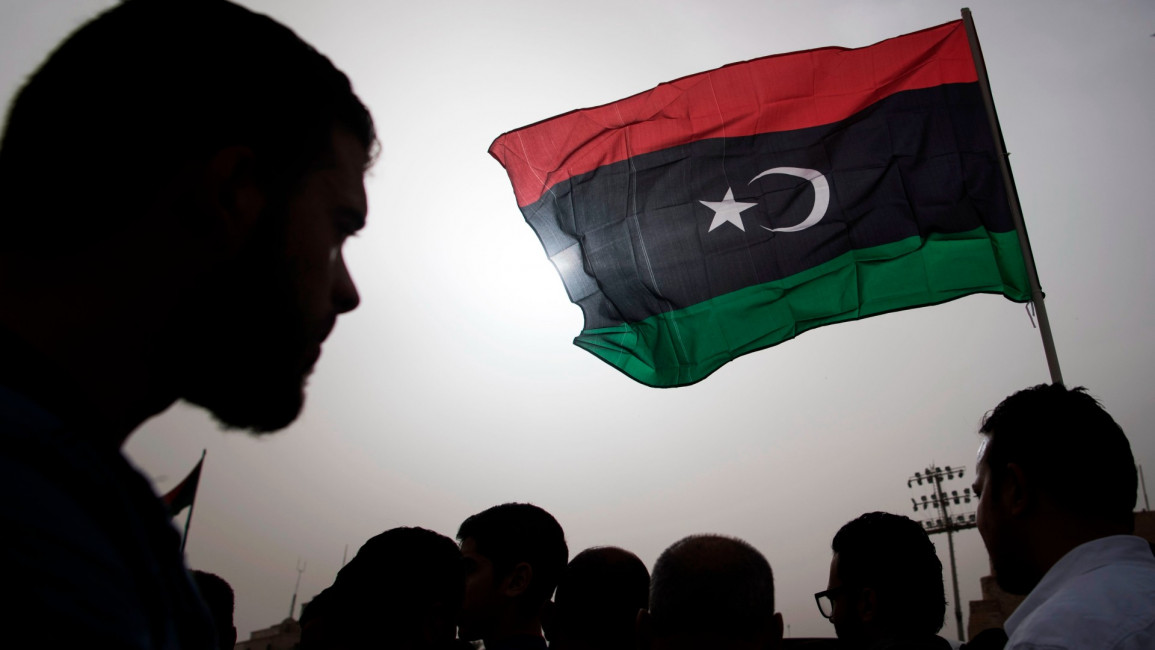In Libya ten years after uprising 'abusive militias evade justice and instead reap rewards': Amnesty
In Libya ten years after uprising 'abusive militias evade justice and instead reap rewards': Amnesty
It is the 10-year anniversary of the overthrowing of Gaddafi, and not much as changed, Amnesty International argues.
4 min read
It is the 10-year anniversary since Gaddafi's fall [Getty]
Ten years after the overthrow of Muammar Gaddafi, justice has yet to be delivered to victims of war crimes and serious human rights violations including unlawful killings, enforced disappearances, torture, forced displacement and abductions committed by militias and armed groups, Amnesty International said today.
The charity is demanding that the Libyan authorities offer "accountability and redress for violations committed both since Gaddafi’s fall and under his rule".
The protests that began in February 2011 were met with violence and quickly escalated into a full-fledged armed conflict, which following an air campaign by NATO, led to Gaddafi’s demise.
"For a decade, accountability and justice in Libya were sacrificed in the name of peace and stability. Neither were achieved. Instead, those responsible for violations have enjoyed impunity and have even been integrated into state institutions and treated with deference," said Diana Eltahawy, Deputy Director for the Middle East and North Africa at Amnesty International.
"Unless those responsible for violations are brought to justice, rather than rewarded with positions of power, the violence, chaos, systematic human rights abuses and endless suffering of civilians that have characterized post-Gaddafi Libya will continue unabated."
"We call on parties to the conflict in Libya and the incoming unity government to ensure that those suspected of committing crimes under international law are not appointed to positions where they can continue to commit abuses and entrench impunity. Individuals who have been accused of war crimes should be suspended from positions of authority pending the outcome of independent, effective investigations," Eltahawy added.
Conflict and instability
In January, the Presidential Council of the Tripoli-based Government of National Accord (GNA) appointed Abu Salim Central Security Force militia leader, Abdel Ghani al-Kikli, also known as Gheniwa, as head of a new entity called the "Stability Support Authority," which reports directly to the presidency.
Gheniwa, Amnesty says, is one of the most powerful militia leaders in Tripoli since 2011 in the neighbourhood of Abu Salim.
In his new role, Gheniwa and his agency will have broad - and vague -powers including law enforcement responsibilities, such as arresting individuals in "national security" cases.
|
Amnesty International has documented war crimes and other serious human rights violations by forces under his command over the past 10 years.
In 2013 and 2014, Amnesty International researchers found that detainees held by Gheniwa-controlled security forces had been subjected to abductions, torture and other ill-treatment, in some cases leading to deaths in custody.
The United Nations Support Mission in Libya (UNSMIL) had similar findings, including concerning deaths in custody due to torture, while the Panel of Experts on Libya also reported attacks against civilians by these forces.
Gheniwa’s militia has reportedly committed unlawful killings, abductions and torture, including sexual violence against women detainees.
The GNA in 2016 had integrated the militia under its Ministry of Interior, prompting critics to accuse the GNA of legitimising the group’s violence.
"Accountability must be a central component of the political process in Libya. All parties to the conflict must remove those reasonably suspected of war crimes and human rights abuses from their ranks and fully cooperate with the UN Fact-Finding Mission. The international community must also ensure that the Mission has the sufficient resources, administrative support and time to complete its work," said Diana Eltahawy.
Widespread impunity
Haitham al-Tajouri, who headed the Tripoli Revolutionaries Brigade (TRB) militia, which has been involved in arbitrary detention, enforced disappearances and torture, was appointed as Gheniwa’s deputy in January 2021.
In Tripoli, the Special Deterrence Forces (al-Radaa), under the command of Abdel Raouf Kara, were integrated into the Ministry of Interior in 2018 and then moved under the Presidential Council in September 2020 by the GNA
Amnesty International and the UN, have documented al-Radaa’s involvement in kidnappings, enforced disappearances, torture, unlawful killings, forced labour, attacks on the right to freedom of expression and the targeting of women and the LGBTQ+ community.
In September 2020, the GNA also promoted Emad al-Trabulsi, who led the "Public Security" militia, to deputy head of intelligence, despite the militia’s involvement in crimes against migrants and refugees, including enforced disappearances.
Successive governments have also failed to bring to justice members of Misrata-based militias responsible for war crimes including attacks against civilians such as the 2011 attack on the town of Tawergha, in which around 40,000 people were forcibly displaced.
Misrata-based militias have also subjected its residents to widespread arbitrary arrests, unlawful killings, torture, sometimes leading to detainees’ death, and enforced disappearances.
In June 2020, with the backing of the GNA, the UN Human Rights Council passed a resolution to establish a Fact-Finding Mission to investigate violations and abuses of international human rights law and violations of international humanitarian law committed by all parties to the conflict in Libya.
Libya’s judicial system remains dysfunctional and ineffective, with judges and prosecutors risking assassination and abductions for doing their jobs, Amnesty reveals, and the same can be said for accountability.


![Minnesota Tim Walz is working to court Muslim voters. [Getty]](/sites/default/files/styles/image_684x385/public/2169747529.jpeg?h=a5f2f23a&itok=b63Wif2V)




![Israeli officials are considering exiling Yahya Sinwar to Sudan as part of a deal to end the war [Getty]](/sites/default/files/styles/image_212x120/public/1251837582.jpeg?h=127ba027&itok=UTeIubIr)
![Debris near Rafic Hariri International Airport [Getty]](/sites/default/files/styles/image_212x120/public/2176162423.jpeg?h=a5f2f23a&itok=XLiO6WHk)
![An Israeli air strike on Jabalia killed teenage journalist Hassan Hamad [Screengrab/X]](/sites/default/files/styles/image_330x185/public/2024-10/hassan%20hamad1.jpg?h=c12e0b96&itok=Rd_dyCVp)